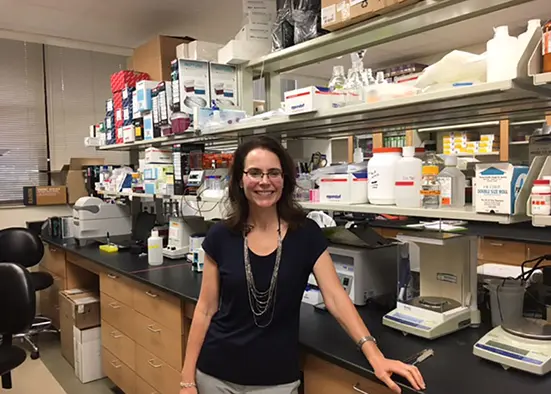WARI is funding scientists who are studying how sex and gender contribute to Alzheimer's and other dementias.
Women's Alzheimer's Research Initiative (WARI)

Women's Alzheimer's Research Initiative grantee Karyn Frick, Ph.D.
In 2016 the Alzheimer’s Association launched the Women’s Alzheimer’s Research Initiative (WARI) to help unlock the mysteries of Alzheimer’s disease in women. A woman’s estimated lifetime risk of developing Alzheimer’s at age 45 is approximately 1 in 5 (for men it is 1 in 10), and nearly two-thirds of the more than 6 million Americans living with the disease today are women — a disparity that cannot be fully explained by women’s relative greater longevity compared to men. To date, the Association has awarded 22 grants totaling more than $4 million to scientists studying how sex and gender contribute to Alzheimer's and other dementias.
The research powered through WARI and the global awareness being generated are inspiring a new wave of scientific interest and exploration. The National Institute on Aging (NIA), a part of the National Institutes of Health, now offers a funding opportunity specifically in the area of “Sex and Gender Differences in Alzheimer’s Disease and Alzheimer’s Disease-Related Dementias.” Using data generated with our awards, WARI-funded scientists have obtained at least $71.7 million in public funding to date to scale their research. They also have published numerous papers on their findings in the top peer-reviewed journals.
In 2020, scientists belonging to ISTAART, our professional society for individuals interested in dementia science, established a Professional Interest Area (PIA) for Sex and Gender Differences in Alzheimer’s Disease. The launch of a PIA is a strong signal of growing global interest in a research topic. A group of ISTAART members published a perspective in 2022 in Alzheimer’s & Dementia®: The Journal of the Alzheimer’s Association outlining critical gaps in knowledge and identifying next steps to improve healthy cognitive aging. They state that identifying drivers of sex and gender differences is a first step toward reducing this health inequity and developing interventions to reduce global risk for Alzheimer’s and other dementia.
The Alzheimer’s Association is offering a new funding opportunity to accelerate novel and innovative research focused on Sex and Gender in Alzheimer’s. Growing this area is especially important at this time, with potential new treatments and interventions to reduce risk for dementia expected in the coming years. Understanding the many factors that contribute to the onset and progression of Alzheimer’s and other dementia in men and women alike is essential to the development of treatments and prevention methods that work for all affected and for determining who will benefit most from different therapies and interventions as they become available.
We seek philanthropic partners to help advance high-potential research in this emerging area. We anticipate issuing eight to ten grants of $250,000 each (this is subject to change). They will be awarded via our rigorous, three-tier proposal review process and begin in 2023 or later.
This Project Advances:
Discovery Science
Early Detection
Treatment
Prevention
